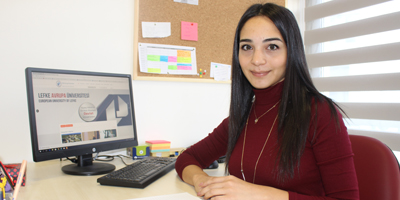EUL Academician Ekenoğlu made some Statements on the Subject of World AIDS Day

Ekenoğlu: “The most important approach for the prevention of HIV infection is to avoid high-risk behaviors and to take protective measures”
European University of Lefke (EUL) Vocational School of Health Services Academician Dr. Yağmur Ekenoğlu gave information about AIDS and stressed that AIDS, the most feared disease among today’s greatest epidemics and contagious diseases, is one of the most important public health problems in the world.
Ekenoğlu described Acquired Immunodeficiency Syndrome in other words AIDS as the immune system disease caused by the Human Immunodeficiency Virus (HIV). Ekenoğlu said that HIV targets the immune system and makes the body’s defense systems vulnerable to infections and some types of cancer and added that the World Health Organization (WHO) declared World AIDS Day on 1 December to draw global attention to the supportive, participatory and cooperative efforts of HIV infections in 1994.
Ekenoğlu said that, “According to the World Health Organization, 36.7 million people worldwide are infected with HIV. So far, more than 35 million people have lost their lives due to HIV”. Ekenoğlu pointed out that there is no cure for HIV infection yet, but the virus can be controlled and spread of infection can be prevented by active antiretroviral (ARV) drugs and added that by doing so HIV-positive individuals can live a healthy, long and productive life. Referring to the importance of early diagnosis and treatment, Ekenoğlu said in cases of suspicion that poses a risk, everyone should take the test without losing time and to consult doctor without hesitation. Ekenoğlu said that the names of the people who have HIV infection is kept secret and added that the ways of protection must be learned in order to be protected from the disease.
Ekenoğlu pointed out that HIV can be infected with body fluids such as blood, mother’s milk, semen secretions, and HIV-positive mothers can infect their baby during pregnancy, or during breastfeeding and added that, HIV is not transmitted by regular daily contacts such as by kissing, embracing or water-sharing.
Ekenoğlu listed behaviors and conditions that poses risk of HIV as;
- Unprotected sexual intercourse and having multiple sex partners
- Using or sharing a contaminated needle, injector and other injection equipment’s
- Unsafe blood transfusion, tissue or organ transplants
- Use of non-sterile tattoo, piercing and acupuncture devices
- Injuries of medical staff caused by needle or cutter, a penetrating instrument.
Ekenoğlu said that AIDS, the most advanced stage of HIV infection, can take up to 2 or 15 years to progress depending on the patient and pointed out the importance of early diagnosis of HIV which is the initiation of appropriate treatment without any progress of the disease, and the prevention of the transmission of the disease to other individuals in the society.
Conditions that require HIV Test;
- Intravenous drug dependence and use of common syringe
- Sexual intercourse with an HIV-positive person
- Travelling to and living in the places which has high rates of HIV
- In case of injury with suspected equipment
- Pregnancy (as early as possible)
- Exposure to sexual assault
- Before marriage
- Persons diagnosed with tuberculosis or sexually transmitted infection
Ekenoğlu said that “Even though the combat against HIV / AIDS has been particularly pessimistic in the first years, HIV infections are not classified as a chronic disease today and the patient can survive without any significant restriction on their lives,” and added that the most important approach for the prevention of HIV infection is to avoid high-risk behaviors and to take protective measures.
